Germany’s Energy Suicide: An Autopsy
Flickers of intelligence at least still glow in rare Western latitudes, as indispensable strategic analyst William Engdahl, author of A Century of Oil, released a sharp, concise summary revealing the skeletons in the glamour closet.
Everyone with a brain following the ghastly Eurocrat machinations in Brussels was aware of the main plot – yet hardly anyone among average EU citizens. Habeck, Chancellor “Liver Sausage” Scholz, the European Commission (EC) Green Energy VP Timmermans, EC dominatrix Ursula von der Leyen, they are all involved.
In a nutshell: as Engdahl describes it, this is about “the EU plan to de-industrialize one of the most energy-efficient industrial concentrations on the planet.”
That’s a practical translation of the UN Green Agenda 2030 – which happens to be metastasized into crypto Bond villain Klaus Schwab’s Great Reset – now renamed “Great Narrative”.
The whole scam started way back in the early 2000s: I remember it vividly, as Brussels used to be my European base in the early “war on terror” years.
At the time, the talk of the town was the “European energy policy”. The dirty secret of such policy is that the EC, “ advised” by JP MorganChase as well as the usual mega speculative hedge funds, went all out into what Engdahl describes as “a complete deregulation of the European market for natural gas.”
That was sold to the Lugenpresse (“lying media”) as “liberalization”. In practice, that’s savage, unregulated casino capitalism, with the “free” market fixing prices while dumping long-term contracts – such as the ones struck with Gazprom.
How to decarbonize and destabilize
The process was turbo-charged in 2016, when the last gasp of the Obama administration encouraged massive export of LNG out of the U.S.’s huge shale gas production.
For that one needs to build LNG terminals. Each terminal takes as much as 5 years to build. Within the EU, Poland and Holland went for it from the start.
As much as Wall Street in the past invented a “ paper oil” speculative market, this time they went for a speculative “paper gas” market.
Engdahl details how “the EU Commission and their Green Deal agenda to ‘decarbonize’ the economy by 2050, eliminating oil, gas and coal fuels, provided the ideal trap that has led to the explosive spike in EU gas prices since 2021.”
The creation of this “single” market control implied forcing illegal rule changes on Gazprom. In practice, Big Finance and Big Energy – which totally control anything that passes for “EU policy” in Brussels – invented a new pricing system parallel to the long-term, stable prices of Russian pipeline gas.
By 2019, an avalanche of Eurocrat energy “ directives” by the EC – the only thing these people do – had established a totally deregulated gas market trading, setting the prices for natural gas in the EU even as Gazprom remained the largest supplier.
As lots of virtual trading hubs in gas futures contracts started popping up across the EU, enter the Dutch TTF (Title Transfer Facility). By 2020 the TTF was established as the real EU gas benchmark.
As Engdahl points out, “TTF is a virtual platform of trades in futures gas contracts between banks and other financial investors. Outside, of course, of any regulated exchange.
So LNG prices soon started to be set by futures trades in the TTF hub, which crucially happens to be owned by the Dutch government – “the same government destroying its farms for a fraudulent nitrogen pollution claim.”
By any means necessary Big Finance had to get rid of Gazprom as a reliable source to allow powerful financial interests behind the Green Deal racket to dominate the LNG market.
Engdahl evokes a case very few know about across Europe: “On May 12, 2022 although Gazprom deliveries to the Soyuz gas pipeline through Ukraine were uninterrupted for almost three months of conflict, despite Russia’s military operations in Ukraine, the NATO-controlled Zelensky regime in Kiev closed a major Russian pipeline through Lugansk, that was bringing Russian gas both to his Ukraine as well as EU states, declaring it would remain closed until Kiev gets full control of its pipeline system that runs through the two Donbass republics. That section of the Ukraine Soyuz line cut one-third of gas via Soyuz to the EU. It certainly did not help the EU economy at a time Kiev was begging for more weapons from those same NATO countries. Soyuz opened in 1980 under the Soviet Union bringing gas from the Orenburg gas field.”
Hybrid War, the energy chapter
On the interminable soap opera involving the Nord Stream 1 turbine, the crucial fact is that Canada deliberately refused to deliver the repaired turbine to Gazprom – its owner – but instead sent it to Siemens Germany, where it is now. Siemens Germany is essentially under American control. Both the German and Canadian governments refuse to grant a legally binding sanction exemption for the transfer to Russia.
That was the straw that broke the (Gazprom) camel’s back. Gazprom and the Kremlin concluded that if sabotage was the name of the game, they couldn’t care less whether Germany received zero gas via Nord Stream 1 (with brand new Nord Stream 2, ready to go, blocked by strictly political reasons).
Kremlin spokesman Dmity Peskov took pains to stress “problems in [gas] deliveries arose due to sanctions that have been imposed on our country and a number of companies by Western countries (…) There are no other reasons behind supply issues.”
Peskov had to remind anyone with a brain that it’s not Gazprom’s fault if “the Europeans (…) make a decision to refuse to service their equipment” which they are contractually obligated to do. The fact is the whole Nord Stream 1 operation hinges on “one piece of equipment that needs serious maintenance.”
Deputy Prime Minister Alexander Novak, who knows one or two things about the energy business, cleared up the technicalities:
“The entire problem lies precisely on [the EU’s] side, because all the conditions of the repair contract have been completely violated, along with the terms of shipping of the equipment.”
All that is inscribed into what Deputy Foreign Minister Sergey Ryabkov describes as “a total war declared against us”, which is “being waged in hybrid forms, in all areas”, with “the degree of animosity of our opponents – of our enemies” being “enormous, extraordinary.”
So none of this has anything to do with “Putin weaponizing energy”. It was Berlin and Brussels – mere messengers of Big Finance – which weaponized the supply of European energy on behalf of a financial racket, and against the interests of European industry and consumers.
Beware of the toxic trio
Engdahl has summarized how, “by systematically sanctioning or closing gas deliveries from long-term, low cost pipelines to the EU, gas speculators via the Dutch TTP have been able to use every hiccup or energy shock in the world, whether a record drought in China or the conflict in Ukraine, to export restrictions in the USA, to bid the EU wholesale gas prices through all bounds.”
Translation: casino capitalism at its finest.
And it gets worse, when it comes to electricity. There is a so-called EU Electricity Market Reform in progress. According to it, producers of electricity – from solar or wind – automatically receive “the same price for their ‘renewable’ electricity they sell to the power companies for the grid as the highest cost, i.e. natural gas.” No wonder the cost of electricity in Germany for 2022 increased by 860% – and rising.
Baerbock incessantly parrots that German energy independence cannot be secured until the country is “liberated from fossil fuels.”
According to Green fanaticism, to build the Green Agenda it’s imperative to completely eliminate gas, oil and nuclear power, which happen to be the only reliable energy sources as it stands.
And it’s here that we see the toxic trio Habeck/Baerbock/von der Leyen ready for their close up. They pose as saviors of Europe preaching that the only way out is to invest fortunes in – unreliable – wind and solar power: the “answer” from Providence to a gas price debacle manufactured by none other than Big Finance, Green fanaticism and Eurocrat “leadership”.
Now tell that to struggling pan-European households whose bills will surge to a whopping, collective $2 trillion as General Winter knocks on the door.
[premium_newsticker id=”211406″]
![]() This work is licensed under a Creative Commons Attribution-NonCommercial 4.0 International License
This work is licensed under a Creative Commons Attribution-NonCommercial 4.0 International License
ALL CAPTIONS AND PULL QUOTES BY THE EDITORS NOT THE AUTHORS
Read it in your language • Lealo en su idioma • Lisez-le dans votre langue • Lies es in Deiner Sprache • Прочитайте это на вашем языке • 用你的语言阅读
[google-translator]
 Keep truth and free speech alive by supporting this site.
Keep truth and free speech alive by supporting this site.
Donate using the button below, or by scanning our QR code.
Perfidious Putin!

 PHILIP GIRALDI
PHILIP GIRALDI
The Russiagate hoax never dies.
• First run on OCTOBER 4, 2022
Russian President Vladimir Putin has certainly been a naughty boy! The always unreliable and unofficial government-originating disinformation source The Hill is reporting that Moscow has spent the equivalent of $300,000,000 in an effort to “influence” world politics in its favor. The story relies on and follows a New York Times special report which again seeks to revive the claim that the Kremlin has been interfering effectively in American elections. Is it a coincidence that all the Russian bashing is surfacing right now before US elections at a time when the President Joe Biden Administration is agonizing over what it describes as sometimes “foreign-supported” domestic extremists? I don’t think so.
The Hill report establishes the framework, claiming that “Russia has provided at least $300 million to political parties and political leaders since 2014 in a covert attempt to influence foreign politics, the US State Department alleges. Multiple news outlets reported that a cable released by the State Department reveals that Russia has likely spent at least hundreds of millions more on parties and officials who are sympathetic to Russia… According to the Associated Press… Russia used front organizations to send money to preferred causes or politicians. The organizations include think tanks in Europe and state-owned entities in Central America, Asia, the Middle East and North Africa. State Department spokesman Ned Price said in a press briefing on Tuesday that Russia’s election meddling is an ‘assault on sovereignty… It is an effort to chip away at the ability of people around the world to choose the government that they see best fit to represent them, to represent their interests, to represent their values.’” [Laughter allowed, especially when we think of US "democracy", the best that money can buy.—Ed)
For the Russians to be able to subvert US democracy, we'd have to have first a genuine democracy, which in reality doesn't exist.
And why is Russia behaving as it allegedly does? According to another State Department source who spoke to The Hill the Joe Biden Administration’s concern is not regarding any single country but the entire world as “we continue to face challenges against democratic societies.” Oddly enough, that Russia should be disinclined to waste its money and other resources on such a quixotic objective never appears to have occurred to the Department of State or to the editors at The Hill.
Typically, the State Department has shared information with select media but has refused to publicly release any parts of the cable which allegedly provide the intelligence-based evidence supporting the claims of Russian meddling. The Hill, perhaps inadvertently, reveals what the whole story really is about when it concludes its piece with “Intelligence assessments have determined that Russia interfered in the 2016 presidential election in spreading disinformation online that was designed to help then-candidate Donald Trump over his opponent, Hillary Clinton. Russia also tried to help Trump in his reelection battle against President Biden in 2020.” So yes, it’s all about Moscow helping Trump against the Democratic candidates. Interestingly, however, most non-Democratic Party-aligned sources have come to agree that it was the Democrats who were trying to damage Trump in 2016 through the use of a fabricated dossier that sought to impugn his character and portray him as a Russian stooge. Far worse, they also used the national security apparatus to “get Trump.”
The Times adds more detail and serves inter alia as a puff piece for the Biden Administration’s foreign policy vis-à-vis Russia. It is based clearly on information provided by unnamed government sources and is largely devoid of any actual evidence, though it does cite some names of Russians to provide authenticity. This is a common trick used in the media and government, particularly by intelligence agencies, to make fabricated material look genuine. One giveaway that the reporting should be considered suspect occurs in the very first paragraph where it states that “Russia has covertly given at least $300 million to political parties, officials and politicians in more than two dozen countries since 2014, and plans to transfer hundreds of millions more, with the goal of exerting political influence and swaying elections.” If the New York Times is privy to Russian top-level planning, even via leaked information from the Central Intelligence Agency (CIA) and other government sources, it would be surprising to learn that the US has that capability. If the National Security Agency (NSA) has secretly broken Russian secure communications to obtain such information, it would be a major security breach and a violation of the Espionage Act of 1918 for any American news outlet to suggest that, indicating pari passu that the report is bogus.
And then there is the question of context. The United States has been routinely doing what is now being blamed on Russia ever since the conclusion of the Second World War. And it does it on a scale much larger than a paltry $300 million. The effort to bring about regime change in Ukraine alone cost something like $5 billion. Meddling in foreign elections and politics is, in fact, a major function of the CIA. It is called “covert action” or referred to in the trade as “CA.” Covert action is defined in the National Security Act of 1947 as “[a]n activity or activities of the United States Government to influence political, economic or military conditions abroad, where it is intended that the role of the United States Government will not be apparent or acknowledged publicly. 50 U.S.C. § 3093(e).”
Most CIA Stations and even the larger Bases overseas have covert action capabilities and their activity is frequently governed by the operating directives that are applied to every country where the Agency operates. In practice, covert action most often consists of recruiting, paying and directing journalists and other opinion-shapers to write stories and support narratives favorable to US interests. In some cases, depending on circumstances, the CA officers will either directly or indirectly fund groups and individuals who are opponents of the established government. If there is a major operation, like Ukraine, success comes when there is regime change.
And what is the value for money with CA operations? It is hard to say but the official intelligence budget for the US government is $84.1 billion with additional sums hidden in other government funding, to include the Pentagon and Homeland Security. The CIA gets a large chunk of that, and, as covert operations are costly, much of the money goes in support of those activities. So, we are talking about the US spending multiple billions of dollars in support of “actions” analogous to those that Putin is being accused of carrying out over the course of a decade in more than two dozen countries worldwide with $300 million! Good luck Vlad!
I might reasonably conclude by observing that the United States government effort to hoodwink the American public into believing a lot of nonsense about what is going on in the world might itself be described as a covert action. And it is particularly interesting in that it is self-funded by the US taxpayer. Never before in history has a free or at least somewhat free people funded its own destruction, but there is always a first for everything.
ABOUT THE AUTHOR / SOURCE
Print this article
The views expressed herein are solely those of the author and may or may not reflect those of The Greanville Post. However, we do think they are important enough to be transmitted to a wider audience.

Did you sign up yet for our FREE bulletin? This work is licensed under a Creative Commons Attribution-NonCommercial 4.0 International License ALL CAPTIONS AND PULL QUOTES BY THE EDITORS NOT THE AUTHORSRead it in your language • Lealo en su idioma • Lisez-le dans votre langue • Lies es in Deiner Sprache • Прочитайте это на вашем языке • 用你的语言阅读Why The Western Elites Are Foolish and Amoral: Gonzalo Lira’s study of imperialist elites conformity, their idea of “success”, and morePlease make sure these dispatches reach as many readers as possible. Share with kin, friends and workmates and ask them to do likewise.
|
|
Excellent analysis of how we end up with leaders who are not able to lead. I was a career military officer and a health professional. Both areas require compliance and hoop jumping. The military has made hoop-jumping the primary means of career advancement. If you don’t advance on schedule, your career ends. Thus, officers become professional hoop jumpers and their actual duties are secondary. The consequence is that my the time an officer becomes field grade, they are often devoid of any real skills but have perfect promotion folders. Hard workers, loyal, but unable to deal with failure or stand up for principle. They can’t and won't rock a boat that needs rocking.
|
|
Superb discussion. Perfectly put. I remember telling a colleague at work that Leaders are born, not trained. Everyone today wants to be a Leader and thinks if they do some dinky "Leadership in XXX" course, that magically they become a Leader. What most fail to grasp is Leadership is more than skills (or compliance to the system) , it's more about Personal Character. 99.9% of the population are not fit for Leadership and cannot ever be a Leader. Their Personal Character betrays this possibility. Thank you Coach, your discussion resonated with me at so many levels. And as you stated, this is why the West is in serious trouble now. Again Superb discussion.
|
|
1:23:50 BINGO. This is exactly what I've been saying this whole time. Exactly exactly exactly. The medical profession has taken a massive hit to its credibility and honour. Doctors have literally allowed some of their patients to die rather than fight for them. It's absolutely disgusting.
|
|
27:50 That is exactly what I experienced at the university several times. For instance, my professor of financial law understood very little of her own specialty and was embarrassingly being corrected by students every 10 minutes. Result: we were arrogantly silenced, asked to spare our questions for after class (she disappeared very quickly after class of course) or started attacking us ad hominem with the approval of the majority of compliant sheep in class.
|
Print this article
The views expressed herein are solely those of the author and may or may not reflect those of The Greanville Post. However, we do think they are important enough to be transmitted to a wider audience.

Did you sign up yet for our FREE bulletin? This work is licensed under a Creative Commons Attribution-NonCommercial 4.0 International License ALL CAPTIONS AND PULL QUOTES BY THE EDITORS NOT THE AUTHORSRead it in your language • Lealo en su idioma • Lisez-le dans votre langue • Lies es in Deiner Sprache • Прочитайте это на вашем языке • 用你的语言阅读PATRICK LAWRENCE: The Strong, and the Merely PowerfulPlease make sure these dispatches reach as many readers as possible. Share with kin, friends and workmates and ask them to do likewise.
|
Did you sign up yet for our FREE bulletin? This work is licensed under a Creative Commons Attribution-NonCommercial 4.0 International License ALL CAPTIONS AND PULL QUOTES BY THE EDITORS NOT THE AUTHORSRead it in your language • Lealo en su idioma • Lisez-le dans votre langue • Lies es in Deiner Sprache • Прочитайте это на вашем языке • 用你的语言阅读Debunking libertarianismPlease share this article as widely as you can. by Caleb Maupin • Patrice Greanville
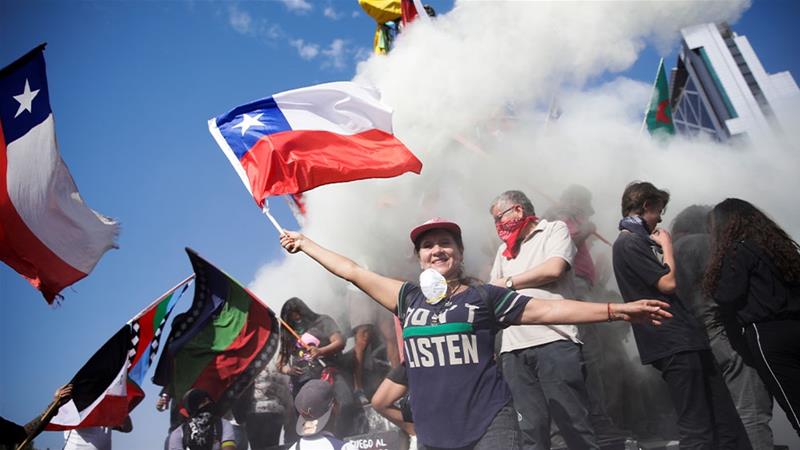 Since 2019 Chile has been shaken by massive protests against the hardcore neoliberal policies implemented by successive right-wing and social democratic regimes implementing libertarian ideas of governance. This is a repost. First run Jun 27, 2020. Few ideologies are more insidious and disastrous to society than libertarianism, but its popularity continues in the US, propelled by fanatics who live in an alternate universe, and the power of a multitude of billionaires, their media, and bought politicians, and the fact it remains the core value of capitalism, aka "the American Way of Life". The affluent—especially their children—lap it up, and there are far too many who become intoxicated with the notion of absolute freedom, a social impossibility. As usual, Caleb Maupin does a pretty good job here, but a couple of things may further elucidate why Libertarians are badly misguided. For one thing, they are ahistorical—in itself an impossibility—as no one can dismiss the historical record and its lessons (duly and reasonably observed, of course). Ahistoricism in this context refers to the fact that libertarians dream of a perfect market that never was and never could be, the one usually sketched out in "neoclassical economics 101", taught by both "centrist" economics evangelist Paul Samuelson, and rightwing Chicago School gurus like Milton Friedman. But while Samuelson, like a good modern liberal, accepts the role of the state in stabilising capitalism, thereby placating the discontented masses born of market failures and abuses (something that FDR understood quite well), Milton Friedman’s libertarian and fiercely anti-Keynesian dogma completely rejects the need for government intervention. Friedman's intransigence holds even for extreme crises, preaching that the market, left to its own devices, will in time clean up excess production and restore equilibrium, thereby returning society to a happy status. Friedman and his acolytes should reflect on the fact that those on the right who complain about "the Left" would do well to remember that it was they who created it. Yes, it was the historical right's innumerable abuses of power and outright tyranny that eventually created a counterforce. Of course, capitalist boom and bust cycles existed long before Keynes came along with his theories, so, in a sense, Friedman was not entirely wrong. Given enough time it is usually true that an economy will right itself and bring back a measure of normalcy to society. But here's one of Friedman's and his fellow libertarians' huge blind spots, for, we must ask, at what cost? Can any government with a modicum of democracy in it escape public fury and retaliation, not just at the polls, but outright social rebellion, when caught in the whirlwind of a wholesale economic implosion? Sitting on high academic or government perches, many of them products of the higher strata, or parvenus and suckups like Edmund Burke catering to the uber-wealthy ("conservatism" has an enduring allure to those who admire and seek approval from "their betters"), leading libertarians are frequently indifferent to the massive human, material, and political cost of such upheavals. Human-made poverty is an abstraction to them. Empathy need not be wasted on such matters. But the historical record cannot be swept under the rug so easily. The wounds of an economic cataclysm run too deep to leave no visible marks on the national psyche. An economic recession, or worse, a depression, can last many years and cause incalculable human suffering and destruction. The Great Depression of 1929 lasted for more than 15 years and threw (depending on the region) from 25% to 33% of the US labor force on the streets. Alcoholism, drug use, prostitution, public health issues, homelessness, and crime of all types proliferated. An untold number of families disintegrated. A virtual army of tramps, a legion of the unemployed, or, rather, "unemployables", crisscrossed the nation in a desperate search for jobs, any jobs, but none could be found as most industries had shrunk or succumbed to the crisis. Their misery was captured by great novelists like John Dos Passos, Upton Sinclair, and John Steinbeck, the man who gave us the classic The Grapes of Wrath, while James Agee and Walker Evans, a writer-photographer team that authored Let Us Now Praise Famous Men (1941), focused on class during their immersion in the daily lives of southern tenant farmers in Alabama in the 1930s. Many of these books were eventually made into memorable films and even TV programs. Meanwhile, for most of the rich, the Depression was simply something they read in the newspapers. Libertarian notions clash with reality
As some astute voices have commented, it looked like Capitalism, because the factories were humming at full capacity. But it was largely Government expenditures in many directions, some would say with a measure of central planning, the dreaded approach of communists, in this case chiefly toward armaments—equipment for millions of troops, plus thousands of tanks, warplanes, submarines and so forth—that did the trick and put Germany back on her feet. Ironic indeed that the most implacable enemies of Bolshevism borrowed not just the "socialist" label, but also crucial aspects —however limited—of their economic approach to social organization. The "Chilean Miracle" that wasn't Chile had changed since the military takeover in 1973. After some rough economic times (sic), the economy posted strong gains in the late 1980s. Real GDP growth averaged 6.2 percent per year, unemployment fell to 6.3 percent from a peak of 30 percent in 1982, and export growth surged. However, sixteen years of conservative economic policies and authoritarian rule had taken their toll on the working class: almost half of the population was living below the poverty line, and real wages remained 19 percent below their 1970 level. Income inequality had worsened, especially in the first decade of the Pinochet regime, when the poor had seen their wages stagnate while social spending had fallen drastically. So much for the fruits of libertarianism at bayonet point. Incidentally, GDP gains are almost meaningless. In neoclassical economics GDP is a highly misleading tool to measure national well-being, Joel C. Magnuson, in his critique of mainstream economics, Mindful Economics (pp 193-4), has this to say about the GDP: As a single number, GDP is a numerical measurement expressed as an undifferentiated mass of products and services. GDP does not consider under what conditions the products and services are produced, whether they actually improve people's lives, the damage done to people and our environment resulting from growth, or how the output is distributed. The problem is that we are chiefly looking at economic activity exclusively through the narrow lens of money transactions, a heavy capitalist bias. As such, both positive and negative events, if subject to business transactions, receive a "positive" value: Sadly, the Chilean libertarian experiment, so lavishly praised in the Western media as a model of capitalist "efficiency" despite its atrocious methods and results, was replicated in other countries also desirous of attaining "development" at any cost. Even the EU—a cluster of vassal nations under Washington's control— has attempted to privatise, based on Chile's and Britain's putative successes, many critical parts of their economies, including their crucial energy companies. Recently, with profits in command, the price of fuel has shot sky-high, precisely at a moment when the EU, having stupidly antagonised and cut its natural gas supplies from Russia, is being forced to pay extortionate prices to US suppliers. This situation is gradually destroying Germany's economy, the EU's economic engine, whose enormous success was due primarily to the availability of cheap gas from Russia. Similar stories are being heard now from other countries in the EU, while Washington, the actual ultimate cause of this disaster, is watching the unraveling with undisguised satisfaction. The EU leadership, in general, has no need, except for its appalling corruption, to follow libertarian precepts. Surely plenty of people in Europe still remember the calamitous experience of Russia in the 1990s, when a savage version of capitalism was force-fed to the naive Soviet public by a mob of slick Ivy League "advisers" and native collaborators preaching the marvels of free markets. Milton Friedman, the maximum guru behind all this, and who in 1976 had already won a Nobel Prize in economics for his dubious lucubrations (the role of Nobel prizes, especially in economics, has long been more political/cultural propaganda than substance), remained unmoved by the horrendous penury and virtual social cataclysms his ideas caused everywhere they were seriously implemented. The privilege of the privileged, as they say.
The God That Really Failed: Recapitulating The unresolvable issues range from the provision of healthcare to the masses, to dependable and equitable social safety nets, to the establishment of efficient transportation systems, public education, and housing for all, not to mention decent and fair remuneration for labor rendered, protection of the natural environment, and so on. But more embarrassingly, they have no answer to the fact that ANY perfect market—the God they worship— will eventually succumb to the collapse of one of its supposed major pillars, perfect competition. It is in fact competition—the serpent that eats itself by the tail—that brings about monopoly, that is, the end of real competition, not to mention the rise of huge megacorporations at the root of oligarchic capitalism and de facto corporatism, and, in time, finance capitalism, the organic cocoon of imperialism. The basic and inexorable law is that competitive markets yield to monopoly in time, and this applies to all industries, with no exception. Consider, for example, that in the 1890s the US boasted thousands of car companies. Hard to believe? Argue with Wikipedia, hardly a communist venue: Starting with Duryea in 1895, at least 1900 different companies were formed, producing over 3,000 makes of American automobiles. World War I (1917–1918) and the Great Depression in the United States (1929–1939) combined to drastically reduce the number of both major and minor producers. During World War II, all the auto companies switched to making military equipment and weapons. However, by the end of the next decade, the remaining smaller producers disappeared or merged into amalgamated corporations. The industry was dominated by three large companies: General Motors, Ford, and Chrysler, all based in Metro Detroit. Those "Big Three" continued to prosper, and the U.S. produced three quarters of all automobiles in the world by 1950 (8.0 million out of 10.6 million). (Automotive industry in the United States, Wikipedia)By the 1950s the list had been cut to less than 10, with the "Big Three" —Ford, Chrysler and GM—dictating terms to much of the industry. What happened? Competition—along with social, economic, technological, and political change no one can fully control or predict— had killed most of the companies alive in 1900 in the normal process of commercial war. Indeed, price wars, bankruptcies, mergers and phaseouts took their toll, not to mention the almost infinite accidents of fate befallng any living entity: proximity to markets, fashion twists, access to corrupt politicians, easier access to financing, access to cheaper and/or superior labor pools, natural advantages (raw materials), and superior designs and/or superior advertising. For any or many of these reasons, the industry had seen a dramatic attrition, from a vigorous, competitive market with numerous firms to a handful, and these were now struggling to remain standing in the face of fierce foreign competition. Commercial life is fluid. Libertarians simply refuse to look at such facts. As for the idea, often marshaled by capitalism's apologists, that pure capitalism "has never been tried", and that if only people gave the system a chance all would be well, that's simply a massive delusion. The problem is many people continue to believe such falsehoods or pretend to believe them, which is worse. While antecedents of capitalist institutions existed in the ancient world, and pockets of capitalism, in its more rudimentary form, may have existed in the Middle Ages, modern capitalism was born primarily in Great Britain ("primarily" because other nations, such as France, Holland, etc. showed similar processes) during the Industrial Revolution, toward the end of the 18th century. In those roughly 300 years and counting, the capitalists have seen several periods in which the system operated under conditions of "laissez-faire", with minimal or no interference from the state—whether monarchic or republican. Because of that simple fact, easily corroborated by history, we can categorically state that libertarian capitalism has been tried, and found to be an unmitigated failure. It hardly needs to be mentioned at this point that libertarians have no solution either for capitalism's unique flaw, overproduction. The perplexing womb of the devastating boom-and-bust cycle. —P. Greanville[/su_note]  Caleb Maupin is a widely acclaimed speaker, writer, journalist, and political analyst. He has traveled extensively in the Middle East and in Latin America. He was involved with the Occupy Wall Street movement from its early planning stages and has been involved in many struggles for social justice. He is an outspoken advocate of international friendship and cooperation, as well 21st Century Socialism. Caleb Maupin is a widely acclaimed speaker, writer, journalist, and political analyst. He has traveled extensively in the Middle East and in Latin America. He was involved with the Occupy Wall Street movement from its early planning stages and has been involved in many struggles for social justice. He is an outspoken advocate of international friendship and cooperation, as well 21st Century Socialism.
ALL CAPTIONS AND PULL QUOTES BY THE EDITORS NOT THE AUTHORS |
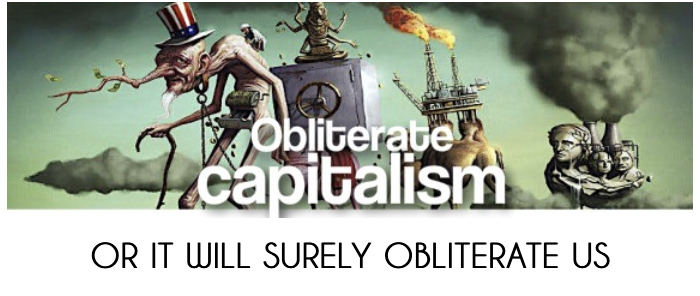






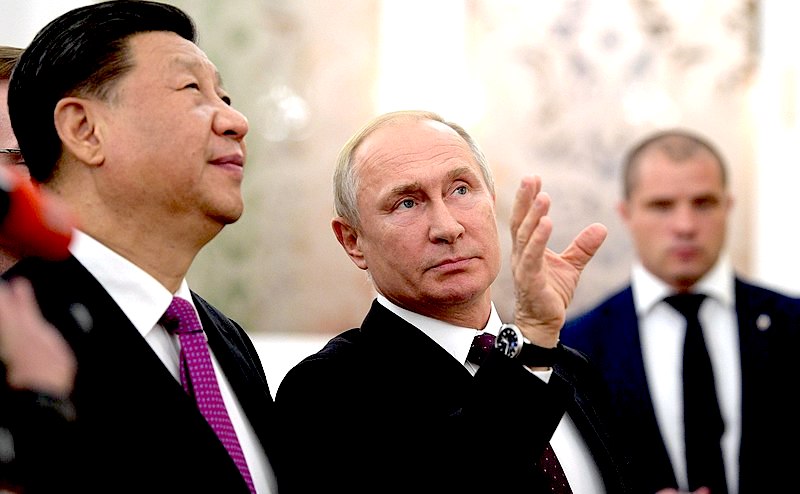

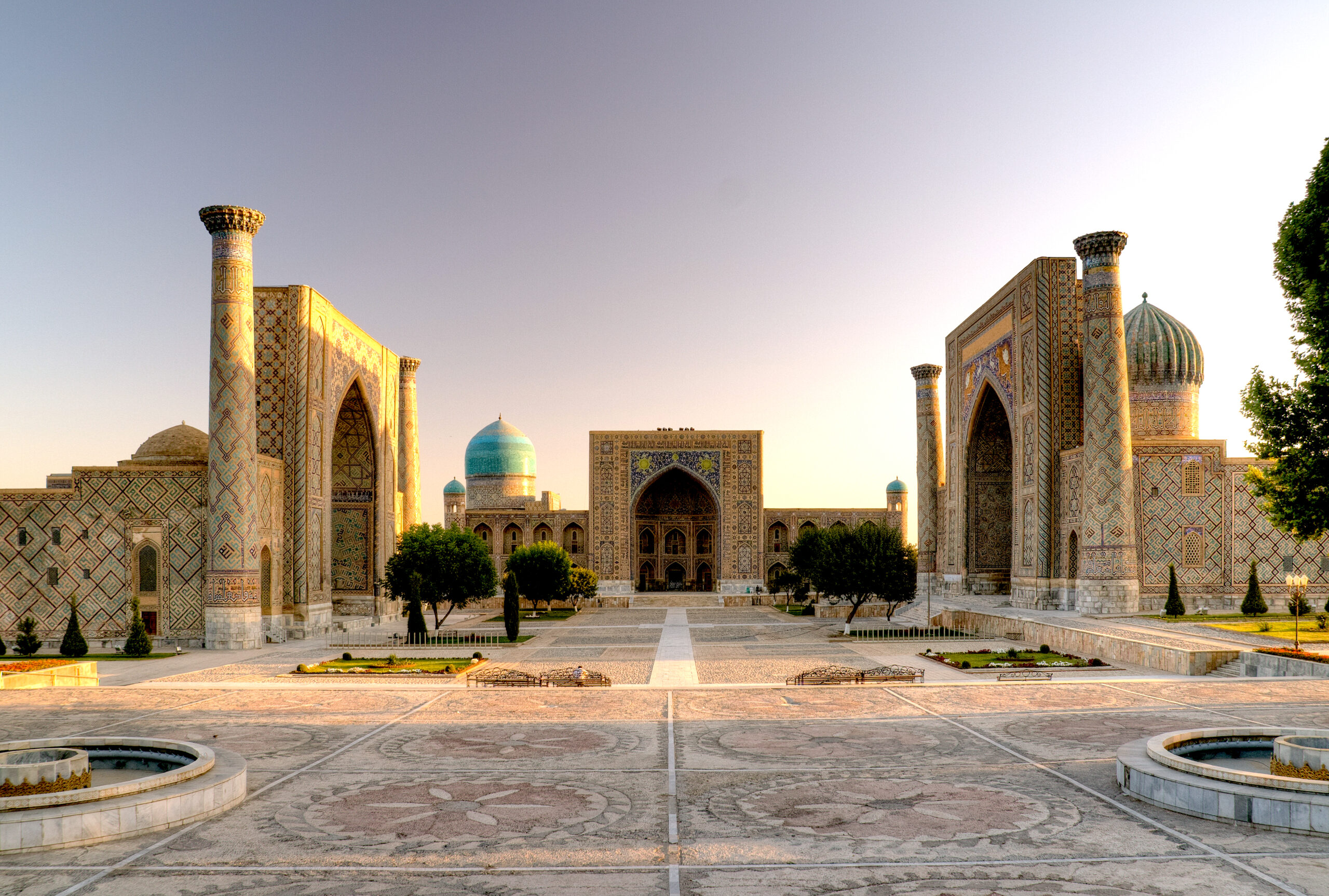


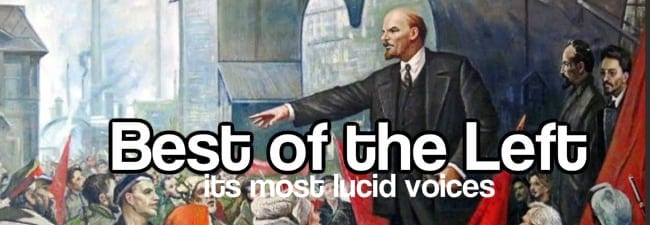



Sierra Grey